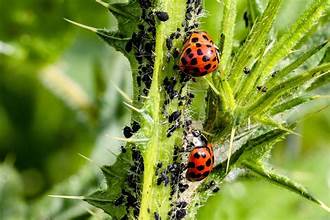
Ultimate Guide to Natural Pest Control for Your Garden: Effective Methods and Strategies
Share
Maintaining a thriving garden often involves managing pests that can damage plants and disrupt their growth. While chemical pesticides are readily available, they come with concerns about environmental impact and potential harm to beneficial insects. Fortunately, there are numerous natural methods and remedies that effectively control pests while promoting a healthy garden ecosystem. In this extensive blog, we explore various strategies and techniques to naturally eliminate pests from your garden.
Understanding Garden Pests and Their Impact
Common Garden Pests:
- Aphids: Small, soft-bodied insects that suck sap from plants, causing curling leaves and stunted growth.
- Slugs and Snails: Feed on young plant shoots, leaves, and fruits, leaving behind holes and slime trails.
- Caterpillars: Larvae of butterflies and moths that consume foliage and flowers, often leading to defoliation.
- Whiteflies: Tiny insects that feed on plant sap, causing yellowing leaves and transmitting plant diseases.
- Japanese Beetles: Metallic green beetles that skeletonize leaves and flowers of many garden plants.
Impact of Pests:
- Reduced Yield: Pests can diminish crop yields and flower production.
- Plant Damage: They can cause aesthetic damage to leaves, flowers, and fruits.
- Disease Transmission: Some pests act as vectors for plant diseases.
Natural Methods to Control Garden Pests
1. Beneficial Insects:
- Ladybugs (Ladybirds): Voracious predators of aphids and other soft-bodied pests.
- Parasitic Wasps: Lay eggs inside pests like caterpillars, ultimately killing them.
- Predatory Beetles: Feed on eggs, larvae, and adult stages of various garden pests.
2. Companion Planting:
- Marigolds: Deter nematodes and repel aphids and other pests.
- Basil: Repels mosquitoes and flies, and enhances the flavor of nearby vegetables like tomatoes.
- Nasturtiums: Attract aphids away from other plants and are themselves edible.
3. Physical Barriers:
- Row Covers: Protect plants from flying insects like cabbage moths and carrot flies.
- Netting: Prevent birds from eating berries and fruits.
4. Organic Sprays and Solutions:
- Neem Oil: Acts as a repellent and disrupts the life cycle of insects like aphids, spider mites, and beetles.
- Garlic and Chili Pepper Spray: Deters many pests with its strong odor and taste.
5. Homemade Remedies:
- Soap Spray: Mix mild liquid soap with water to suffocate soft-bodied insects like aphids and spider mites.
- Diatomaceous Earth: Sprinkle around plants to kill slugs, snails, and other pests with its abrasive action.
6. Cultural Practices:
- Crop Rotation: Reduces pest buildup by disrupting their life cycles.
- Mulching: Helps control weeds and creates barriers against crawling pests like slugs and snails.
- Pruning: Removes infected plant parts and improves air circulation, reducing fungal diseases.
7. Biological Controls:
- Nematodes: Beneficial soil-dwelling organisms that prey on pests like grubs and caterpillars.
- Microbial Insecticides: Use bacteria or fungi to target specific pests without harming beneficial insects.
Implementing Natural Pest Control Strategies
1. Identification:
- Regularly inspect plants for signs of pest damage, including chewed leaves, wilting, and unusual growth patterns.
- Use guidebooks, online resources, or seek advice from local gardening experts to identify pests accurately.
2. Integrated Pest Management (IPM):
- Combine multiple pest control strategies to create a holistic approach tailored to your garden's needs.
- Monitor pest populations and intervene early to prevent outbreaks.
3. Considerations for Success:
- Timing: Apply treatments during early morning or late afternoon to minimize harm to beneficial insects.
- Consistency: Regularly apply preventive measures and monitor pest populations to maintain control.
- Patience: Natural methods may take time to show results compared to chemical pesticides but contribute to long-term garden health.
Conclusion
By embracing natural pest control methods, you not only protect your garden from damage but also foster a balanced ecosystem where beneficial insects thrive. Experiment with different techniques and adapt them to suit your garden's specific challenges and preferences. With dedication and a proactive approach, you can achieve a pest-free garden that flourishes with vibrant plants and abundant harvests, all while promoting environmental sustainability and biodiversity.
